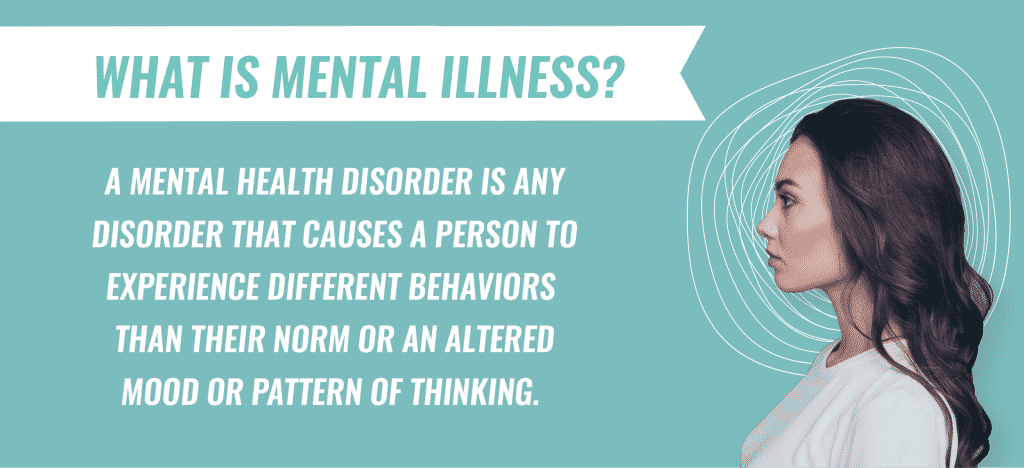A mental health disorder is defined as any condition that affects a person’s thoughts, behaviors or moods. Learn more about common mental illnesses as well as causes, diagnosis and treatment.
Mental health disorders are common conditions, affecting an estimated 54 million Americans each year. Mental health conditions can cause frequent stress and can be both emotionally and physically trying. If you or a loved one is struggling with mental health concerns, know that you are not alone and help is available.
What Is Mental Illness?
A mental health disorder is defined as any condition that affects a person’s thoughts, behaviors or moods. While some mental health disorders last for a limited period, others are chronic and lifelong. When these issues cause high levels of stress or affect their daily functioning or relationships, treatment may be necessary to help a person manage their symptoms.
Common Mental Health Disorders
A few of the most commonly diagnosed mental health disorders include the following:
Also referred to as depressive disorders, mood disorders are characterized by moods or emotions that are incongruent with one’s current life circumstances. Depending on the specific mood disorder, this incongruency may involve gloomy, low and depressed moods, or excessively happy and euphoric moods called “manias.” Some of the most well-known mood disorders include bipolar disorder, major depressive disorder and postpartum depression.
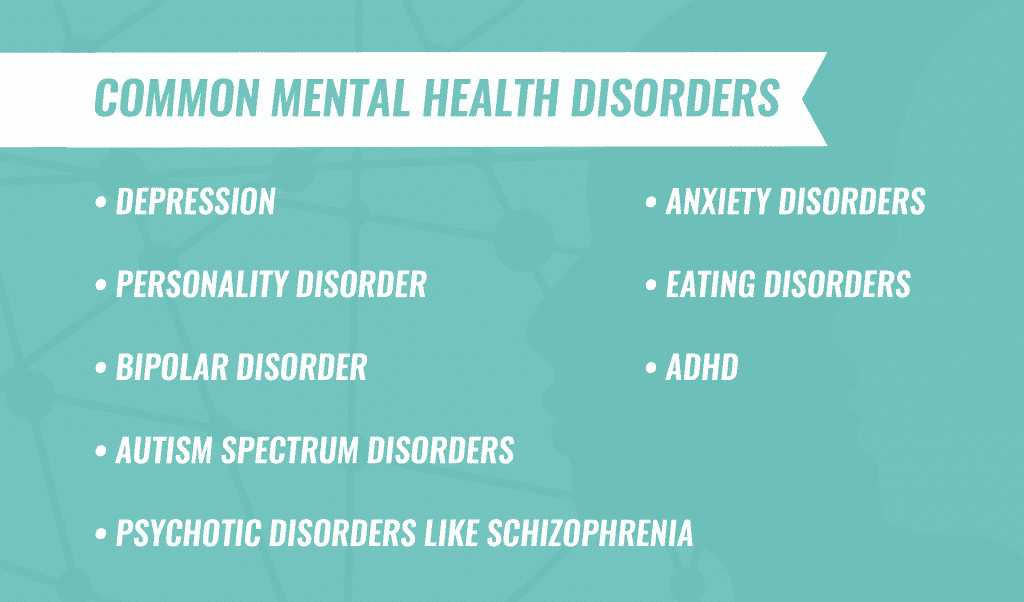
Causes of Mental Illness
Although the exact cause of most mental illnesses is unknown, most develop as the result of a combination of biological, psychological and environmental factors.
Some mental illnesses have been linked to abnormal functioning of the brain due to chemical imbalances, injuries or developmental abnormalities. Mental illnesses sometimes run in families, suggesting that genetics also plays a role. Other links to mental health disorders include:
- Long-term substance abuse
- Poor nutrition and exposure to toxins
- Undergoing severe psychological trauma as a child, including emotional, physical or sexual abuse
- Death or divorce
- Dysfunctional family life
- Feelings of inadequacy, low self-esteem, anxiety, anger or loneliness
- Social or cultural expectations
- Substance abuse
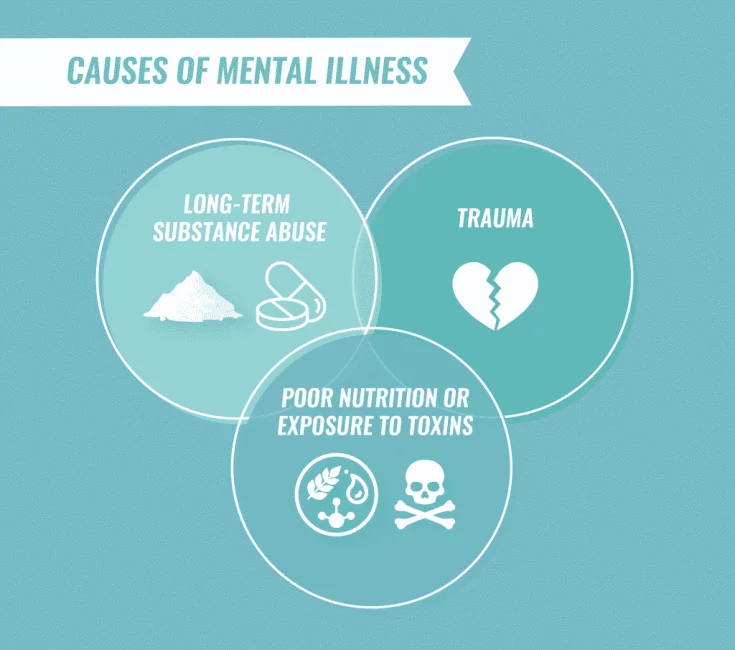
Diagnosing Mental Illness
Physicians will typically check for related complications while diagnosing a mental health disorder and perform:
- Physical exams to rule out any physical problems that could be causing the symptoms
- Lab tests to evaluate body processes or screen for alcohol and drugs
- Psychological evaluation to assess mental illness symptoms, thoughts, feelings and behavior patterns
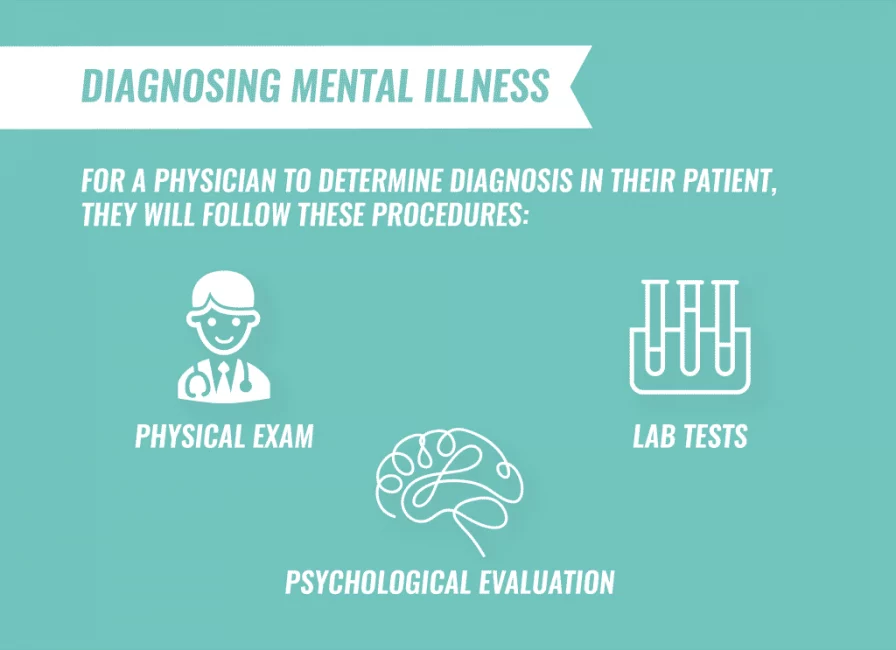
Statistics on Mental Illness
Mental health disorders are one of the most common causes of disability in the United States and bear the largest disease burden of any category of health conditions. An estimated 54 million Americans live with a serious mental illness or mental health issues in any given year.
Mental illness also includes alcohol and substance use disorders. In 2013, approximately 17.3 million Americans over the age of 12 lived with an alcohol use disorder in the past year. Roughly 6.9 million Americans 12 and older abused illicit drugs and were dependent on them in the year before being surveyed.
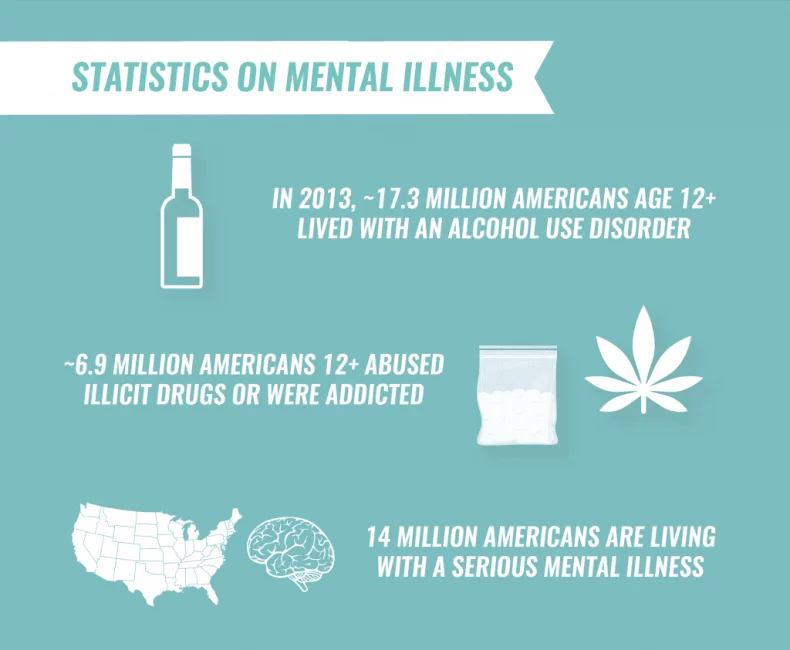
Mental Health and Substance Abuse
Co-occurring disorders, or mental health and substance use disorders presenting simultaneously, are exceedingly common. People living with a drug or alcohol use disorder are about twice as likely to already exhibit symptoms of a mental health disorder. Similarly, those who are living with a mental health disorder are twice as likely to develop a substance abuse problem as well.
Mental Illness Stigma
Some individuals still view mental illnesses as threatening. These views can lead to various forms of exclusion and discrimination for people with mental health problems.
Some of the additional harmful effects of stigma can include:
- Reluctance to seek help or treatment
- Lack of understanding by family, friends, co-workers or others
- Fewer opportunities for work, school or social activities
- Trouble securing housing
- Bullying, physical violence or harassment
- Health insurance that doesn’t adequately cover mental illness treatment
Mental Health Treatment
Treatments may vary depending on the type of mental health disorder a person has. However, mental health care almost always involves some form of psychiatric counseling. Medications may also be prescribed.
If you or a loved one is living with co-occurring addiction and mental health disorders that are affecting your life, The Recovery Village can help. Individuals with co-occurring mental health and substance use disorders can receive comprehensive treatment from one of the facilities located across the country. To learn more, call The Recovery Village today to speak with a representative.
Mental Health Conditions

Editor – Megan Hull
Does Mental Illness Run in Families?
Yes, mental illness can run in families. If one family member has a mental health disorder, the likelihood of another family member having the same disorder rises. However, even though mental illness runs in families, there may be considerable variations in the presentation of symptoms among family members, as some may present with more mild or severe symptoms. Mental illness is generally caused by a mixture of genetic and environmental factors, so even if a particular mental illness runs in families, it does not necessarily mean that a person will get develop the condition if another family member has it.
How Common Is Mental Illness?
Mental illness is very common in the United States, but not everyone who lives with a mental illness seeks treatment. About 1 in 5 adults in the United States experience mental illness and about 1 in 25 adults in the United States experience serious mental illness in a given year. Approximately 46.4% of people will face a mental health condition in their lives.
How Many Mental Health Disorders Are There?
Currently, there are more than 200 identified mental health disorders. The Diagnostic and Statistical Manual of Mental Disorders (DSM) is a tool used to classify and diagnose mental health disorders and includes more than 450 definitions.
Is Addiction a Mental Health Disorder?
Yes, addiction is classified as a mental health disorder. Addiction to drugs or alcohol has a long-term impact, interferes with a person’s daily functioning and produces symptoms that cause significant distress.
Is Mental Illness a Disability?
A mental illness can become a disability if it has a long-term impact and hinders a person’s daily functioning. A person can apply for social security benefits for mental illness as long if they meet criteria that deem the illness to be disabling, not allowing them to work.
Is Mental Illness a Disease?
No, mental illness is not a disease. A disease can be defined as a specific condition in the body that originates from a precise cause and has defined symptoms. Mental illness rarely stems from an exact cause and instead arises from multiple factors, such as genetics and heredity, environmental stressors and prenatal exposure to toxins. There tends to be a lot of overlap in mental illness symptoms, especially when conditions co-occur, which makes it difficult to identify and define specific symptoms. Mental illness is better characterized as a disorder or syndrome that describes a vast array of psychological and emotional conditions.
Is Mental Illness Hereditary?
The precise cause of mental illness is unknown, but it is believed that mental illness is caused by a mixture of genetic, mental and environmental factors. Heredity and genetics are representative of one type of biological factor that contributes to mental illness. Some mental illnesses tend to run in families and susceptibility is passed on through genes. It is important to note that a person may never develop a mental illness even if they have a genetic predisposition, as environmental factors also play an important role in the formation of mental health conditions.
Is Mental Illness Treatable?
Yes, mental illness is treatable. In many cases, the symptoms of a mental illness improve with psychotherapy, medication or a combination of both. Alternative treatments, such as support groups and self-help materials, can also be used in conjunction with therapy and medication. Treatment impacts people differently and should always be individualized and discussed with a mental health practitioner.
Medical Disclaimer
The Recovery Village aims to improve the quality of life for people struggling with substance use or mental health disorder with fact-based content about the nature of behavioral health conditions, treatment options and their related outcomes. We publish material that is researched, cited, edited and reviewed by licensed medical professionals. The information we provide is not intended to be a substitute for professional medical advice, diagnosis or treatment. It should not be used in place of the advice of your physician or other qualified healthcare providers.

